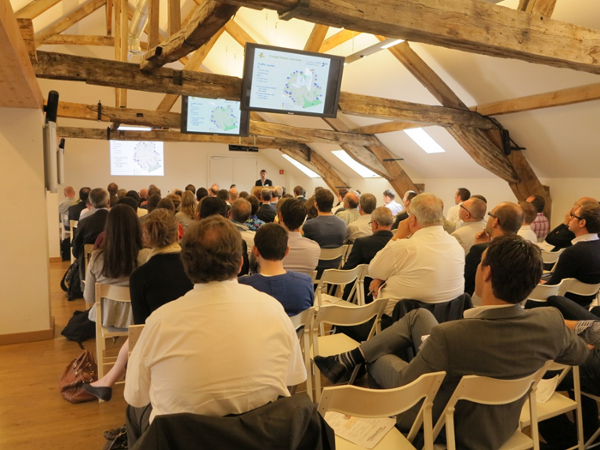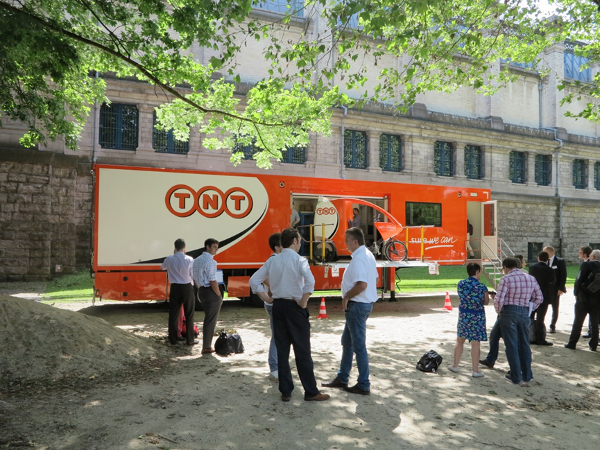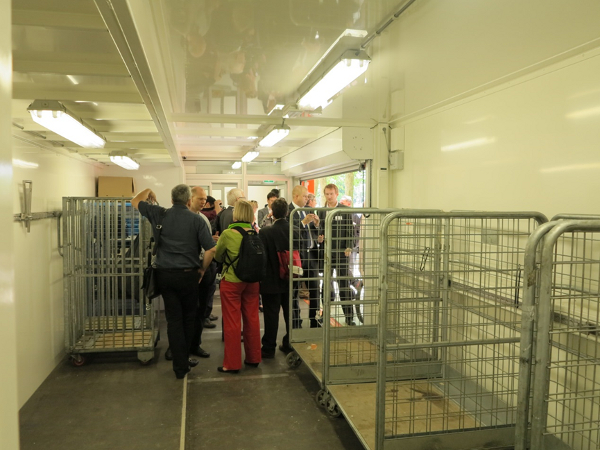
Project News
STRAIGHTSOL Newsletter - Issue 6 available (pdf, 688Kb)
[More]
See our animations
[More]
New deliverables available
[More]
Summary results booklet available
[More]
STRAIGHTSOL evaluation framework resources available
[More]
Open ENLoCC event videos available
[More]
STRAIGHTSOL Newsletter - Issue 5 available (pdf, 193Kb)
[More]
Kuehne-Nagel's video: Rail tracking and warehouse management (6:50 mins)
[More]
Demonstration poster presentations available to download
[More]
Tuesday 2nd July 2013 - Brussels
STRAIGHTSOL Demonstration Workshop
TNT Express - Mobile Depot
Presentations
- City logistics: state of play under FP7 and future vision of European R&D, Liam Breslin (European Commission)
- Introduction to STRAIGHTSOL, Jardar Andersen (TOI)
- Freight Transport in the Brussels-Capital Region, Christophe de Vogel (Bruxelles Mobilité / Mobiel Brussel)
- Mobile Depot, Mette Kok (TNT Express)
- Silent deliveries, Ivan Van de Brul (Colruyt)
- Silent (last mile) Deliveries, Davy Decock (Delhaize)
- Straightsol evaluation framework, Sara Verlinde (VUB)
Workshop report
Introduction
This demonstration workshop, organised by the Vrije Universiteit Brussel (VUB) in collaboration with TNT Express, Colruyt and Delhaize, was attended by a mixed audience of 95 people, comprising researchers, local policy makers and their administrations, logistics service providers, retailers, shippers and associated professional organisations.

Figure 1: Workshop participants during the presentation of Mr. Christophe de Voghel
The workshop aimed at:
- Presenting the mobile depot demonstration of TNT Express
- Introducing the new STRAIGHTSOL demonstration with Colruyt and Delhaize on night time deliveries that will take place in Brussels later this year
- Encouraging the different stakeholders to share their views on city logistics in general and on the two presented concepts in particular
- Presenting the STRAIGHTSOL evaluation framework to a large group of stakeholders.
Presentations
The workshop chair, Prof. Cathy Macharis (VUB), introduced guest speakers:
- Bruno De Lille, State Secretary of the Brussels-Capital Region, who welcomed the workshop participants
- Liam Breslin (European Commission, DG Research and Innovation, Head of Surface Transport Unit), who outlined the policy context and EU strategy on urban mobility. He described various current R&D activities in city logistics (e.g. OPTICITIES, TURBLOG, VIAJEO PLUS, FURBOT) and highlighted future funding opportunities, in particular, the Horizon 2020 programme. He also mentioned the new EU technology platform on logistics, ALICE, launched on 12 June 2013.
The STRAIGHTSOL project coordinator, Mr. Jardar Andersen (TOI), presented the project's approach, aims and activities and gave a brief presentation of the other five demonstrations in the project that are not taking place in Brussels.
Mr. Christophe de Voghel (Brussels-Capital Region) provided various freight statistics for the region and in the city of Brussels (see presentation) and presented a SWOT (strengths, weakness, opportunities and threats) analysis for urban freight transport. Existing urban freight measures employed include on-street and off-street loading bays, freight routes and, within the LaMilo project, freight vehicle flows are currently being surveyed to determine where consolidation centres might be best positioned.
Ms. Mette Kok (TNT Express) opened the second session introducing TNT Express, explaining the mobile depot concept (a trailer fitted with a loading dock and warehousing facilities) and highlighting some barriers they had to overcome while setting up this pilot. Using a mobile depot to do the inner-city deliveries and pick-ups decreases the number of vans in the city-centre as the last-mile operations are carried out by dispatch riders on electrically driven tricycles and by small electric vans. This way of working does not only make the deliveries more environmentally friendly, it also allows TNT Express to avoid the recurring traffic jams. The fact that the depot is mobile, and not a fixed centrally located depot, avoids the cost of an additional depot, facilitates preparatory operations in the TNT Express depot near the airport and allows movement between different locations, if desired.
The TNT Express demonstration ran from mid-June to the end of August 2013. Each morning, the trailer was loaded at the TNT Express hub near the airport with all inner-city deliveries for that day and then driven to a parking location in the Parc du Cinquantenaire. From there, the final deliveries were carried out by four dispatch riders on electrically driven tricycles. The use of the mobile depot and the four tricycles covered all pick-ups and deliveries of two diesel vans in Schaarbeek (PC 1030), Etterbeek (PC 1040) and Sint-Joost-ten-Node (PC 1210).

Figure 2: Mobile depot during the technical visit
The main challenges faced during the set up and running of the mobile depot were:
- The longer stem time of the truck transporting the mobile depot versus vans
- Need for support of multiple other stakeholders, e.g. local authorities, cyclo courier company
- Finding a suitable parking location: location, accessibility, size
- Stabilising the mobile depot
- Access to electricity
- Sorting space in the mobile depot
- Limited loading capacity of the tricycles
- Security of the mobile depot and the goods inside
- Cleaning of the mobile depot
Results from the demonstration were not available at the time of workshop; however, subsequent findings have included:
- Savings of diesel kilometres: 0.92 km/stop before and 0.52 km/stop during the demonstration
- Increase in operating costs: deliveries and pick-ups through the Mobile Depot are twice as expensive
- Slight impact on the quality of service: deliveries/pick-ups are performed slightly later in the day compared to the original situation with vans (due to longer stem time of Mobile Depot in the morning)
- The load rate of the Mobile Depot was deliberately kept low (40%) during the demonstration phase to guarantee the quality of service. Increasing the load rate will have a positive impact on diesel kilometres, emissions and operating cost savings. The demonstration dealt with around 2% (100/5000) of all TNT operations in Brussels.
The workshop also introduced the other STRAIGHTSOL demonstration that will take place in Brussels later this year. This demonstration aims to test night time deliveries and will be carried out by two Belgian retailers: Colruyt and Delhaize, represented by Mr. Ivan Van de Brul and Mr. Davy Decock, respectively. Both retailers believe that night deliveries would be a way to better spread their DC operations and the goods reception at shops. They also believe it would gain them time and fuel by avoiding traffic congestion during peak hours. The idea could be beneficial for society as well. Earlier tests with night deliveries suggest that delivering shops outside the morning and evening peak hours has several advantages:
- Fewer trucks on the road during the peak hours which positively impacts traffic congestion
- Increased traffic safety in city centres with fewer confrontations between because trucks and other road users
- Fewer emissions because trucks are not stuck in traffic
Because they believe night deliveries could be a win-win solution, and in view of possible road pricing schemes in the future, Colruyt and Delhaize would like to see what the possibilities are for night deliveries. Still, there are a few stumbling blocks resulting from the fact that loading and unloading operations produce noise which can be irritating for people living close, especially at night. Therefore, it can be expected that some local citizens will not be in favour of night-time deliveries. Also the public authorities and the Brussels public service for environment and energy in particular would like to see the effect of this shift.
This demonstration has multiple goals:
- Demonstrate to two important stakeholders (the authorities and the local citizens) that it is possible to do night-time deliveries without causing additional noise nuisance. Both Colruyt and Delhaize have been investing and will continue to invest in silent trucks, silent rolling stock and the education of truck drivers. Apart from that, the demonstration also aims to assess the real nuisance as it is experienced by the local citizens.
- Several other projects have tested urban night-time deliveries. Usually, this is done with a one-dimensional focus on the noise issues. It is the goal of this project to assess the impact of night-time deliveries in a congested and densely populated urban area on all stakeholders.
The demonstration will take place on five demonstration sites (2 of Colruyt, 3 of Delhaize). A two-stage approach will be followed. In the first stage, on each site, deliveries will be made between 8pm and 10pm with noise levels being measured in line with the requirements of the Brussels public service for the environment and energy. As long as the noise levels are considered to be satisfactory, the public service will then grant temporary permits to allow the second stage (full-scale night-time deliveries) to take place over a period of one month, planned for late 2013. During that period, the five demonstration sites will receive deliveries during the night on a regular basis. Noise measurements will be done for a period of four consecutive days.
Mr. Ivan Van de Brul (Colruyt) stated that their aim is to have 30% deliveries moved in the early morning, late evening or night. Investments of around 3,500,000 euros have been made on 45 silent trailers (extra insulation to reduce noise), 25 silent pallet trucks (electric with special rubber wheels), 29 covered unloading docks (screening device at the premises which reduces noise), training of drivers to reduce noise (turning off engine, closing doors quietly, putting cardboard under the tail board etc). Two trailers and 2 pallet trucks have been specifically bought for the Straightsol Brussels trial.
Ms. Sara Verlinde explained the STRAIGHTSOL evaluation framework with a focus on how it incorporates all stakeholders and their varying objectives.
Q&A session
Q: Why was CNG preferred over electric vehicles?
A: CNG is proven technology in the freight industry whereas electric vehicles are too expensive and not flexible enough. Electric trucks are generally rigids and do not have the payload capacity needed. However, we are investigating electric options.
Q: All these solutions for mobility need investment ... will these tests also cover the economics of wider roll out of these concepts?
A: Yes, the Straightsol project will consider this for all its demonstrations.
Q: Availability of land for city logistics operations is an issue... How will the decision makers guarantee a good price for logistics operations and guarantee that land will be set aside for logistics activities?
A: That is a question for governmental policy makers.
Q: Will you evaluate all elements of the logistics to determine your energy spent (e.g. pallet trucks, refrigeration etc.)?
A: Yes
Visit to the mobile depot
The workshop concluded with a visit to the mobile depot at its parking location in the Parc du Cinquantenaire.

Figure 3: Inside view of the mobile depot during the technical visit
Feedback from Straightsol European Reference Group
After the workshop a meeting was held with Straightsol’s European Reference Group, an independent panel of six people providing constructive criticism of the project's activities. Their comments on the workshop included:
Mobile depot
- A very good concept, however:
- Surprising that a side lift was preferred to a tail lift and the need for external power, rather than using a LNG generator (quiet and with low emissions), is also a little surprising.
- The location near a children's playground may have health and safety issues.
- There may be branding issues associated with having a marked truck next to a well-known monument.
- The mobile depot is in competition with electric vans but the mobile element is novel. Perhaps it should be more mobile in future trials.
- It would be good to know in the evaluation to what extent local authorities would grant public space for mobile depots in the city and what criteria they would stipulate for granting space.
- One needs to compare this concept in relation to other sustainable logistics schemes.
- Can the mobile depot also be used as a drop off and/or collection point?
- Would work very well under a road pricing/restricted access scenario for freight vehicles.
Night-time deliveries
- Compare Euro V trucks against Euro VI and look at the benefits in terms of noise, fuel consumption etc.
- Review previous night time delivery trials (e.g. Transport for London did a lot of work on noise in London before and after the introduction of the London Lorry ban.)
- All stakeholders must be involved from the beginning in the evaluation. However, it is not clear whether local citizens should be warned about possible noise beforehand as they then might be more aware of it. Perhaps it is better just to do the noise measurements.
Workshop - Original Briefing note
Background
Urban areas represent particular challenges for national and international freight transport,
both in terms of logistical performance and environmental impacts (emissions, noise,
accidents, congestion and land use). Urban freight is indispensable for the city's economy but
at the same time freight deliveries significantly affect the attractiveness and quality of urban
life. Urban freight transport represents between 20 to 25% of road space contributing to
between 10 to 20% of urban road traffic. STRAIGHTSOL is one of several projects co-financed
by European Commission that study urban-interurban interfaces and last mile
distribution promoting efficient and sustainable solutions for urban-interurban shipments and
urban logistics. This is expected to be achieved through:
- Developing a new impact assessment framework for measures applied to urbaninterurban freight transport interfaces.
- Supporting a set of innovative field demonstrations showcasing improved urbaninterurban freight operations in Europe.
- Applying the impact assessment framework to live demonstrations and develop specific recommendations for future freight policies and measures.
The problem
As most large European cities, Brussels is a congested city in terms of traffic jams. This does
not only affect individuals driving their cars, it also hampers urban deliveries as these are
usually carried out by van or by small truck. The combination of diesel vehicles and a
congested urban area makes urban deliveries environmentally unfriendly. Furthermore, these
delivery vehicles also contribute to the traffic jams. There is also room for improvement from
the viewpoint of the operator: having to deal with busy traffic and congestion makes it
expensive to keep the inner-city deliveries and pick-ups reliable and fast and makes it difficult
to consider the environment.
This is also the case for TNT Express which is an express parcel service provider. Many of the company's customers are located in urban settings causing a great part of its operations taking place there. That is why they aim to test an innovative solution which is less hindered by congestion and provides a cost efficient and emission free last mile.
The demonstrated solution
TNT developed and designed a mobile depot which is a trailer fitted with a loading dock and
warehousing facilities. As from mid-May, this mobile depot will be used for the inner-city
deliveries and pick-ups for a period of three months. For the duration of the demonstration,
TNT Express will carry out the last-mile deliveries and pick-ups in the centre of Brussels
from their mobile depot. Each morning, the trailer is loaded at the TNT Express hub near the
airport with all inner-city deliveries for that day and then driven to a predefined central
location. From there, the final deliveries are carried out by dispatch riders on electrically
driven tricycles and by small electric cars.
Desired outcomes
Decreased truck-kilometres are the main goal of the demonstration. The combination of a
reduction of truck-kilometres and the use of environmentally friendly vehicles will also lead
to reduced CO2-emissions. Besides that, TNT Express aims for costs per stop that are not
higher than in the baseline scenario and maintained delivery times and punctuality for their
inner-city operations. They also do not want this solution to negatively influence employee
satisfaction, information flows and noise levels.

Events
29/08/2014
Project Final Review meeting, Brussels
12/06/2014
Smart Urban Freight Conference hosted by NewRail, Newcastle University, including contributions from Straightsol project
[Conference webpage]
13/06/2014
Evaluation Framework Training Sessions, Newcastle University
[More]
02/04/2014
Open ENLoCC event, Brussels, including presentation of Colruyt and Delhaize night-time deliveries demonstration
[More]
24/09/2013
Demonstration Results Workshop/Exhibition in Amsterdam
[More]
02/07/2013
TNT Express demonstration workshop in Brussels
[More]
23/04/2013
Oxfam demonstration workshop in Batley, near Leeds, UK
[More]
07/03/2013
DHL Supply Chain demonstration workshop in L'Hospitalet de Llobregat/Barcelona, Spain
[More]
31/10/2012
Oslo: Demonstration workshop
Smart Urban Transport - Standardising information in retail supply chain management and last-mile distribution
[More]
13/09/2012
Thessaloniki: Demonstration workshop
"Intelligent" systems for the interconnection of urban-interurban freight transport
[More]
03/07/2012
Brussels: STRAIGHTSOL project workshop on Smart Urban Freight Solutions
(in collaboration with the Smartfusion partnership)
[More]